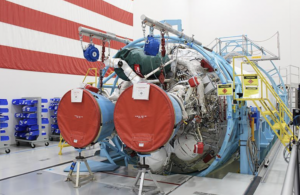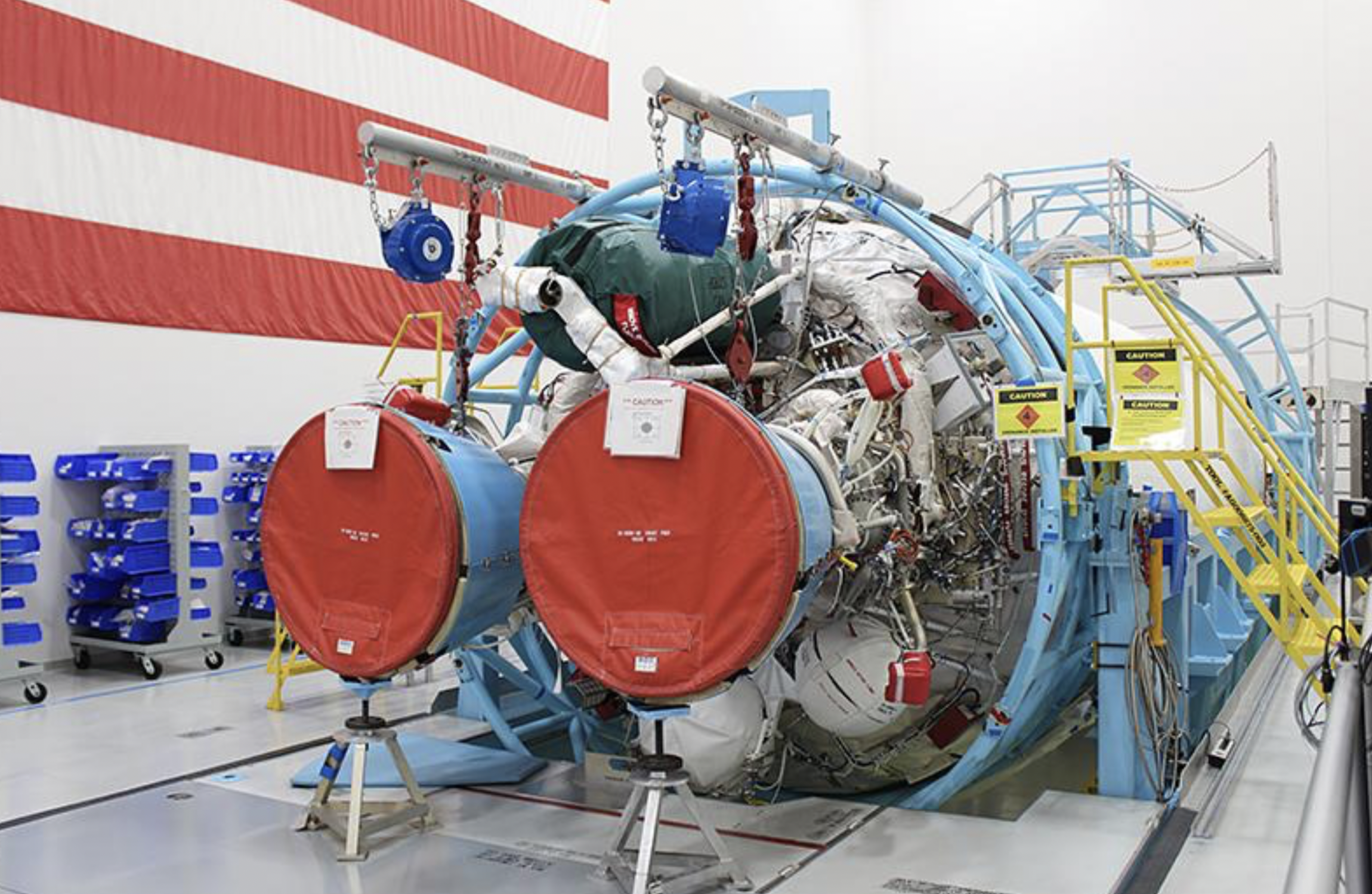SpaceX sends up Space Coast's 66th launch of the year
Tuesday, 28 November 2023 18:17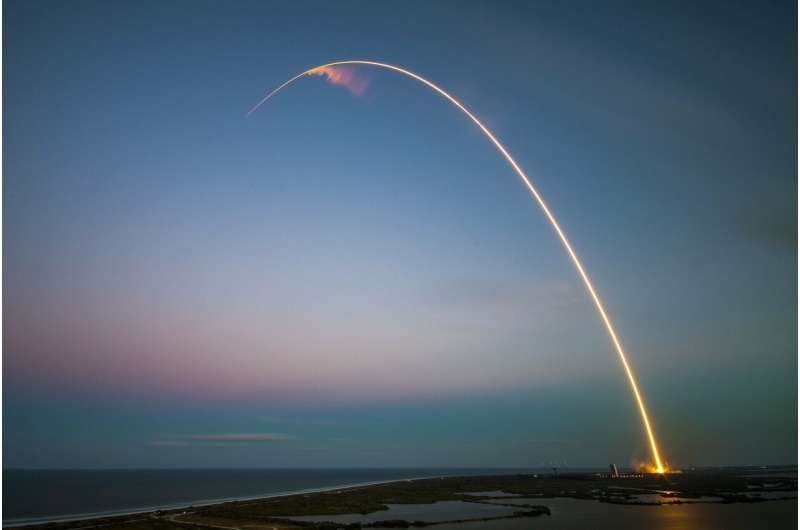
SpaceX chalked up another Starlink mission from Cape Canaveral Space Force Station to mark the Space Coast's 66th launch of the year.
A Falcon 9 with 23 of the company's Starlink internet satellites lifted off from Canaveral's Space Launch Complex 40 at 11:20 p.m. Monday.
The booster flew for the 17th time, the third time SpaceX has flown one of its boosters 17 times, although one has flown 18 missions. It landed safely on the droneship Just Read the Instructions downrange in the Atlantic.
This is the fourth month in a row the Space Coast has shoehorned in seven launches in a month, and the fifth time this year, although only the second time SpaceX has been responsible for all seven of those launches in one month.
SpaceX has flown 62 of the 66 Space Coast missions overall, with Relativity Space making its lone launch of its Terran 1 3D-printed rocket back in March, and United Launch Alliance managing one Delta IV Heavy and two Atlas V rocket launches since June.
SpaceX has also flown 25 times from California's Vandenberg Space Force Station, making this its 87th orbital flight this year, not counting the two failed attempts to launch its Starship and Super Heavy rocket from Texas.
If warp drives are impossible, maybe faster-than-light communication is still on the table?
Tuesday, 28 November 2023 17:28
I'm sure many readers of Universe Today are, like me, fans of the science fiction genre. From the light sabers of "Star Wars" to the neuralyzer of "Men in Black," science fiction has crazy inventions aplenty and once science fiction writers dream it, scientists and engineers try and create it. Perhaps the holy grail of science fiction creations is the warp drive from "Star Trek" and it is fair to say that many have tried to work out if it is even possible to travel faster than the speed of light. To date, alas, to no avail but if the warp drive eludes us, what about faster-than-light communication.
Let's start with the warp drive. The concept is a drive that can propel a spacecraft at speeds in excess of the speed of light. According to the "Star Trek" writers, the speed was described in factors of warp speed where they are converted to multiples of the speed of light by multiplication with the cubic function of the warp factor itself. Got it. Don't worry, it's not crucial to this article.
Aerocapture is a 'free lunch' in space exploration
Tuesday, 28 November 2023 17:22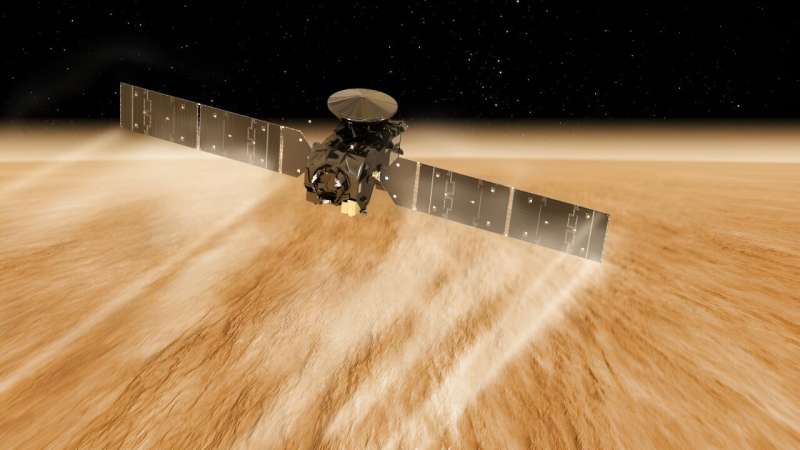
When spacecraft return to Earth, they don't need to shed all their velocity by firing retro-rockets. Instead, they use the atmosphere as a brake to slow down for a soft landing. Every planet in the solar system except Mercury has enough of an atmosphere to allow aerobraking maneuvers, and could allow high-speed exploration missions. A new paper looks at the different worlds and how a spacecraft must fly to take advantage of this "free lunch" to slow down at the destination.
Aerocapture is an orbital transfer maneuver in which a spacecraft makes a single pass through a planetary atmosphere to decelerate and achieve orbit insertion. On the other hand, aerobraking uses a propulsive burn plus repeated dips into the atmosphere—i.e., atmospheric drag—to gradually slow the spacecraft and reduce the size of the orbit to achieve orbit insertion.
The new paper posted to the arXiv preprint server, by Athul Pradeepkumar Girija from the School of Aeronautics and Astronautics at Purdue University, notes that one of the significant risks associated with aerocapture is the uncertainty in the atmospheric density.
Warming ocean causing rapid glacier retreat
Tuesday, 28 November 2023 15:00
With all eyes about to focus on the COP28 climate conference in Dubai, new scientific findings show, again, that the climate crisis is taking its toll on Antarctica – a continent, up to recently, thought better able to withstand the immediate effects of rising global temperatures.
Using satellite data, scientists have discovered that the ice shelf extending into the ocean from Cadman Glacier on the west Antarctic Peninsula collapsed, leaving the glacier exposed to unusually warm ocean water, which caused the glacier to accelerate and retreat rapidly.
Firefly to launch a Lockheed Martin satellite antenna demonstration
Tuesday, 28 November 2023 13:45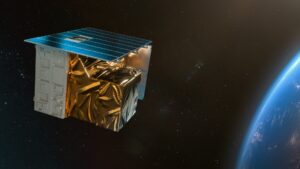

Space Team Europe for Euclid: Henk Hoekstra
Tuesday, 28 November 2023 11:30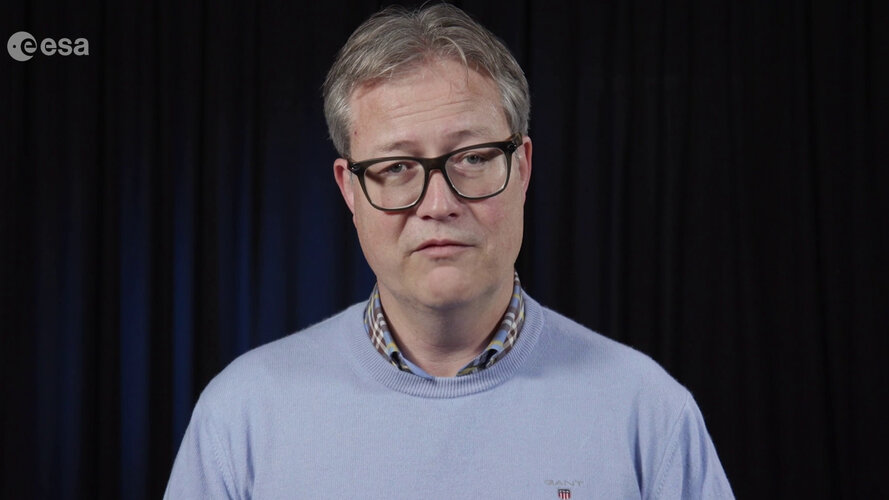 Video:
00:03:08
Video:
00:03:08
Henk Hoekstra, professor of observational cosmology at Leiden University, the Netherlands, shares his professional trajectory linked to weak gravitational lensing, a technique used by ESA’s Euclid mission.
Henk explains how Euclid will reveal the dark side of the Universe. He uses enlightening examples involving a swimming pool and other terrestrial objects. Listen to Henk Hoekstra to understand how Euclid can make the invisible visible.
Space Team Europe is an ESA space community engagement initiative to gather European space actors under the same umbrella sharing values of leadership, autonomy, and responsibility.
Lockheed Martin aims for rapid on-orbit operations with Electronically Steerable Antenna
Tuesday, 28 November 2023 09:04 Lockheed Martin (NYSE: LMT), a renowned leader in the aerospace and defense sector, recently announced a significant step forward in space technology with the upcoming launch of a wideband Electronically Steerable Antenna (ESA) payload demonstrator. This initiative is a testament to Lockheed Martin's dedication to enhancing space capabilities for quick operational readiness once in orbit.
Lockheed Martin (NYSE: LMT), a renowned leader in the aerospace and defense sector, recently announced a significant step forward in space technology with the upcoming launch of a wideband Electronically Steerable Antenna (ESA) payload demonstrator. This initiative is a testament to Lockheed Martin's dedication to enhancing space capabilities for quick operational readiness once in orbit. Archimedes Platform Successfully Tested by Above: Space and Electric Sky
Tuesday, 28 November 2023 09:04 In a significant advancement for space technology, Above: Space Development, in collaboration with Electric Sky, has successfully tested the Archimedes platform, a novel, rapidly deployable, free-flying on-orbit system. This platform marks a new era in space infrastructure, encompassing a wide range of functions including solar panels, beamed power, and electronically steerable antenna arrays fo
In a significant advancement for space technology, Above: Space Development, in collaboration with Electric Sky, has successfully tested the Archimedes platform, a novel, rapidly deployable, free-flying on-orbit system. This platform marks a new era in space infrastructure, encompassing a wide range of functions including solar panels, beamed power, and electronically steerable antenna arrays fo Millennium Space Systems completes CDR for Missile Track Custody Space Vehicle
Tuesday, 28 November 2023 09:04 Millennium Space Systems, a subsidiary of aerospace giant Boeing [NYSE: BA], has reached a significant milestone in the development of the Missile Track Custody (MTC) space vehicle with the successful completion of the Critical Design Review (CDR), a crucial phase in the project, less than a year after receiving the green light to proceed.
The MTC project is a cornerstone of the United Sta
Millennium Space Systems, a subsidiary of aerospace giant Boeing [NYSE: BA], has reached a significant milestone in the development of the Missile Track Custody (MTC) space vehicle with the successful completion of the Critical Design Review (CDR), a crucial phase in the project, less than a year after receiving the green light to proceed.
The MTC project is a cornerstone of the United Sta Embry-Riddle's Innovative Mission Control Lab prepares students for booming space sector
Tuesday, 28 November 2023 09:04 In an era where the space industry is rapidly expanding, Embry-Riddle Aeronautical University has taken a significant step to prepare its students for the challenges of tomorrow. The university has announced the opening of a new satellite mission control center on its Daytona Beach Campus, a move poised to place its graduates at the forefront of the burgeoning space sector.
According to th
In an era where the space industry is rapidly expanding, Embry-Riddle Aeronautical University has taken a significant step to prepare its students for the challenges of tomorrow. The university has announced the opening of a new satellite mission control center on its Daytona Beach Campus, a move poised to place its graduates at the forefront of the burgeoning space sector.
According to th WVU Team Tackles Radio Interference in Astronomy with NSF Funding
Tuesday, 28 November 2023 09:04 In a significant stride towards enhancing the clarity of astronomical observations, researchers at West Virginia University (WVU) are pioneering methods to combat the pervasive issue of human-made radio frequency interference (RFI). This interference, emanating from ubiquitous sources such as cell phones, televisions, and radar systems, poses a substantial obstacle in detecting radio signals cru
In a significant stride towards enhancing the clarity of astronomical observations, researchers at West Virginia University (WVU) are pioneering methods to combat the pervasive issue of human-made radio frequency interference (RFI). This interference, emanating from ubiquitous sources such as cell phones, televisions, and radar systems, poses a substantial obstacle in detecting radio signals cru Tackling the Growing Challenge of Space Debris
Tuesday, 28 November 2023 09:04 As humanity ventures deeper into the realm of space exploration and commercialization, the threat posed by space debris has escalated, demanding urgent attention and innovative solutions. The year 2023 witnessed a series of pivotal developments and initiatives, highlighting the critical challenge of orbital debris, which presents a significant risk to operational satellites, the International Sp
As humanity ventures deeper into the realm of space exploration and commercialization, the threat posed by space debris has escalated, demanding urgent attention and innovative solutions. The year 2023 witnessed a series of pivotal developments and initiatives, highlighting the critical challenge of orbital debris, which presents a significant risk to operational satellites, the International Sp Wenchang Set to Become China's Premier Commercial Space Launch Hub by Next Year
Tuesday, 28 November 2023 09:04 Wenchang, a city in South China's Hainan province, is rapidly establishing itself as the forefront of China's burgeoning commercial space industry. The city, known for the Wenchang Spacecraft Launch Site, is advancing towards becoming the nation's first dedicated hub for commercial space launches, aiming to commence regular operations by the next year. This significant development was announced
Wenchang, a city in South China's Hainan province, is rapidly establishing itself as the forefront of China's burgeoning commercial space industry. The city, known for the Wenchang Spacecraft Launch Site, is advancing towards becoming the nation's first dedicated hub for commercial space launches, aiming to commence regular operations by the next year. This significant development was announced SwRI's PUNCH Mission Set for 2025 Launch: A New Era in Solar Wind Study
Tuesday, 28 November 2023 09:04 The Polarimeter to UNify the Corona and Heliosphere (PUNCH) mission, a significant endeavor led by Southwest Research Institute (SwRI), has recently crossed a pivotal milestone, advancing its journey toward a planned 2025 launch. On November 17, 2023, the mission successfully passed its internal system integration review, marking a crucial phase in its development. This step signifies the transi
The Polarimeter to UNify the Corona and Heliosphere (PUNCH) mission, a significant endeavor led by Southwest Research Institute (SwRI), has recently crossed a pivotal milestone, advancing its journey toward a planned 2025 launch. On November 17, 2023, the mission successfully passed its internal system integration review, marking a crucial phase in its development. This step signifies the transi 

